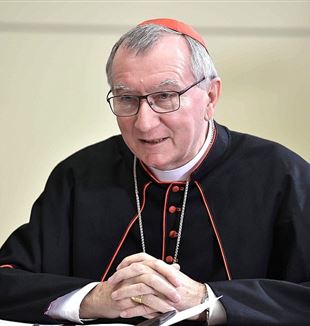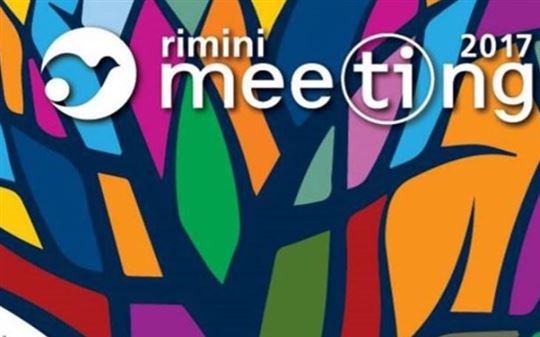
Message from Cardinal Pietro Parolin
Cardinal Pietro Parolin sends a Message to the organizers and participants of the 38th Meeting for Friendship Among Peoples.Your Excellency,
In the name of the Holy Father Francis, and my own, I would like to express cordial greetings to you and the organizers and participants of the 38th Meeting for Friendship Among Peoples.
Every year, the title of the Meeting encourages reflection on aspects of existence that the pressing rhythms of everyday life often cause us to set aside. Everything seems to slide off us, so anxious are we to turn the page quickly. Life becomes fragmented and runs the risk of becoming arid. For this reason, it is precious every now and then to stop and consider the great questions that define what it means to be human, questions cannot be ignored entirely.
We can read the theme of the Meeting 2017 in this sense, as well. “All that you have, bequeathed to you by your father, earn it in order to possess it” (Goethe, Faust). It is an invitation to reclaim our origins from within a personal history. For too long, it was thought that the inheritance of our forbearers would remain with us like a treasure that only needed to be preserved in order to keep the flame alive. This has not proven to be the case. The fire that burned in the hearts of those who preceded us has slowly grown dim.
One of the limitations of current societies is that of having a short memory, and casting off like a useless and heavy burden that which preceded us. But this has grave consequences. Consider education: how can we hope to raise the new generations without memory? How can we think of building the future without taking a position on the history that generated our present? As Christians, we do not cultivate nostalgic dwelling on a past that no longer exists. Rather, we look forward hopefully.
We do not have spaces to defend, because the love of Christ has no unsurmountable frontiers. We live in a favorable time for a Church that goes outwards, but a Church rich in memory, moved by the wind of the Spirit to go to the encounter with those who seek a reason for living. There are innumerable traces of the presence of God throughout the history of the world; in fact, beginning with creation, everything speaks of Him. The real and living God wanted to share our history: “The Word became flesh and made His dwelling among us” (Jn 1:14). God is not a memory, but a presence, to be embraced ever anew, like the beloved for the person who loves.
There is a disease that can strike the baptized, which the Holy Father calls “spiritual Alzheimer’s.” It consists in forgetting the history of our personal relationship with God, the first Love that won us over and made us His own. If we become “forgetful” of our encounter with the Lord, we are no longer sure of anything. We are assailed by fear that blocks our every movement. If we abandon the sure harbor of our bond with the Father, we become prey to the caprices and whims of the moment, slaves to “false infinites” that promise the moon but leave us disappointed and sad, in the frenetic search for something that fills the emptiness of the heart. How can we avoid this “spiritual Alzheimer’s”? There is only one road: actualize the beginnings, the “first Love,” which is not a discourse or abstract thought, but a Person. The grateful memory of this beginning ensures that we have the drive necessary to face the ever new challenges that demand equally new answers, always remaining open to the surprises of the Spirit who blows where He will.
How does the great tradition of the faith reach us? How does the love of Christ reach us today? Through the life of the Church, through a multitude of witnesses who for two thousand years have renewed the announcement of the event of the God-with-us and enable us to re-live the experience of the beginning, as it was for the first ones who encountered Him. “Galilee is the place where they were first called, where everything began!” and it this way for us, as well. For this reason, we need to “return to […] that blazing light with which God’s grace touched me at the start of the journey […] when Jesus passed my way, gazed at me with mercy and asked me to follow Him. […] To return there means reviving the memory of that moment when His eyes met mine, the moment when He made me realize that He loved me” (FRANCIS,Homily at the Easter Vigil Mass, April 19, 2014).
That gaze always precedes us, as Saint Augustine reminded us, speaking of Zacchaeus. “Zacchaeus was seen, and therefore saw” (Sermon 174, 4.4). We should never forget this beginning. This is what we have inherited, the precious treasure we must re-discover every day, if we want it to be ours. Fr. Giussani left an effective image of this commitment that we cannot abandon: “Those who love the child instinctively offer him, and fill his knapsack with, the best of their experiences […].There comes a point, however, when nature gives the child the instinct to take this knapsack and look at it […] What one has been told must become a problem! Unless this happens, it will either be irrationally rejected or irrationally kept but will never mature. […] Once the child has this knapsack in his hands, he rummages around inside, examining its contents. […] The young student will now explore the contents of his knapsack, critically comparing what's inside of it - his received tradition - with the longings in his heart […] a need for the true, the beautiful, and the good. […] By doing so, he will gain maturity and become an adult.” (The Risk of Education, New York 2001, 9-10).
“Earn what has been bequeathed to you” is a commitment to which the Mother Church calls every generation. The Holy Father encourages us not to be frightened by the toil and suffering that are part of the journey. It is not our lot to look at reality from the balcony, nor can we stay comfortably seated on our couch watching the world pass by in front of us on TV. Only by earning the true, beautiful and good that our forbearers have given us, can we live the epochal change in which we are immersed as an opportunity, as an opportunity to communicate convincingly the joy of the Gospel to women and men.
For this reason, Pope Francis invites the organizers and volunteers of the Meeting to sharpen their sight in order to catch the many more or less explicit signs of the need for God as the ultimate meaning of existence, so that they can offer people a living response to the great questions of the human heart. Once again this year, may visitors find in you trustworthy witnesses to the hope that does not disappoint. Talk to them with the encounters, exhibits, performances, and above all, with your own life.
As he encourages you to pray for his ministry, His Holiness willingly imparts to you, your Excellency, and all the participants of the Meeting, the requested Apostolic Blessing.
I would like to extend my own personal good wishes as well, and, in the interim before I speak on the final day of the Meeting, very gladly confirm, together with my high esteem, that I remain yours devotedly in the Lord.
Cardinal Pietro Parolin
Secretary of State